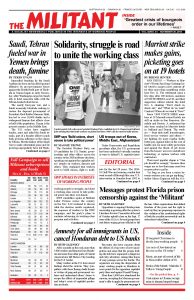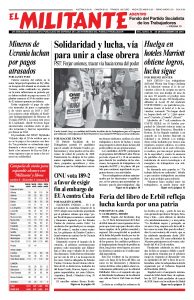After a month on the road, more than 5,000 workers and farmers from Honduras and some from other parts of Central America have left Mexico City, heading for the U.S. border.
Many workers in the U.S. have mixed feelings about the caravan. They sympathize with those fleeing death threats or victims of gang and government violence and understand others’ desire to escape the effects of imperialist pillage and today’s crisis of capitalist production and trade.
But many also have concerns about the effects of a big wave of new immigration and sense that the groups leading the trek have organized a dangerous and risky adventure, raising false hopes of easy passage across the border. The organizers are using the desperation of many working people in Honduras to score points for the opposition capitalist party there and against Donald Trump.
More than 2,600 have abandoned the caravan, accepting the Mexican government’s offer to apply for permanent residency. Hundreds have returned home.
Others vow to continue. “In the U.S. we can earn more and give something to our family,” Nubia Morazan, 28, told The Associated Press.
Using the caravan as a pretext — which Trump demagogically calls an “invasion” — the president signed an executive order saying that asylum applicants have to go to one of the 26 official ports of entry. In Tijuana — where caravanistas have been told by their organizers they’ll get better treatment — the backlog is so great that it takes up to five weeks to get an application.
Trump sent 5,600 soldiers to the border with Mexico in a symbolic show of force. By law, unlike border agents, they are forbidden to detain immigrants.
The cynical abuse of these workers by middle-class leftists and liberals, and their calls for the U.S. to “open the border,” are all aimed at advancing their “resistance” to the Trump presidency.
No fundamental shift in U.S. policy
Despite Trump’s rhetoric, White House policy does not represent a radical shift in U.S. immigration policy.
The president’s goal is not to seal the border, much less deport all the millions of workers without papers already here. Like the Bush, Clinton and Obama administrations before it, the White House seeks to increase control over the flow of immigrant labor, to turn off and on as the bosses’ need.
This can be seen in the huge expansion of the so-called guest worker program in agriculture. In May, at Trump’s request, the Departments of State, Agriculture, Labor and Homeland Security agreed to “streamline” rules to let more workers in as bosses face a labor shortage in the current upturn in capitalist production.
The number of workers given work permits under the H-2A visa program increased by nearly 50 percent this harvest season compared to last year, reaching triple the number from five years ago. This will continue until the capitalist economy inevitably crashes.
From the bosses’ viewpoint these “guest” workers are as exploitable as those without any recognized documents. If they go on strike or quit their job they become deportable.
The constant migration of workers from semicolonial countries to better off imperialist centers is a permanent feature of capitalism. U.S. imperialism depends on superexploited immigrant labor to bolster its competitive advantage against rival capitalists. And it uses low-wage workers without papers to try and divide and drive down the wages of all workers.
Working people here need to demand amnesty for the more than 11 million immigrant workers in the U.S. so that they can join unions and fights for better wages and working conditions and more without fear of deportation. And to defend the right of political asylum of all those fleeing death threats and threats of torture and violence.
Honduras is under the boot of U.S. imperialism. Two U.S. corporations monopolize the production of bananas, one of the country’s main exports. The foreign debt of Honduras to U.S. banks and bondholders is $8.6 billion.
There is a heated class struggle in Honduras, from the recent 77-day strike by banana workers to decadeslong struggles for land by poor peasant farmers. But workers there face the same challenges as workers in the U.S. — lack of a class-struggle working-class leadership to organize an effective fight against capitalist exploitation and abuse.
There is a powerful example in revolutionary Cuba, where Fidel Castro and the July 26 Movement united and led workers and peasants to overthrow the U.S.-backed dictatorship of Fulgencio Batista and take power themselves. They’ve been in power for 65 years, offering solidarity to others worldwide.
Workers here should organize to do all in our power to aid the struggles of working people in Honduras. Demand cancellation of the country’s crushing foreign debt.
Strengthening the struggles of workers here to take on the bosses, their government and political parties on a course to take political power in the U.S. is the most important thing we can do.

